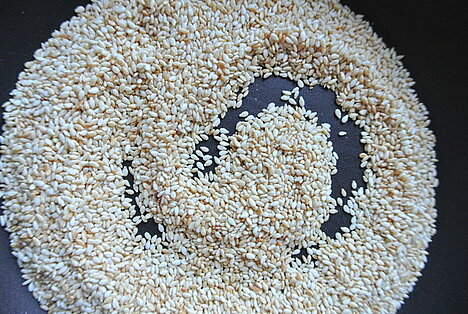Sesame seeds

What is sesame?
Sesame is one of the oldest cultivated plants in the world and originally comes from India. Today it is mainly cultivated in tropical and subtropical regions. The sesame plant produces small, oval seeds, which can be white, black or brown, depending on the variety. The seeds are very rich in oil and are therefore often processed into sesame oil, which is used in cooking and medicine. Ground sesame seeds are also used to make tahini, a sesame paste that is used for hummus or halva, for example.
Can dogs eat sesame seeds?
The good news is that sesame seeds are generally safe for dogs. You can give your four-legged friend small amounts as a snack or sprinkle them over their food. Sesame seeds contain many healthy nutrients such as iron, magnesium and calcium, which are also important for your dog's health. They also have anti-inflammatory properties and can lower blood pressure.
Benefits of sesame seeds for dogs
Sesame seeds can be a great addition to your dog's diet, giving them a little extra energy while promoting their well-being when used sparingly - after all, too much of a good thing isn't necessarily healthy. Here are some of the benefits of sesame seeds for dogs:
- They provide important fatty acids that are good for your dog's skin and coat.
- They contain vitamin B and vitamin E, which boost the immune system and promote cell health.
- They are a good source of calcium, which ensures strong bones and teeth.
- They have a high fiber content, which aids digestion and prevents constipation.
- They have an antioxidant effect and protect against free radicals that can cause cell damage.
Disadvantages of sesame seeds for dogs
Although sesame seeds have many benefits, there are also some disadvantages that you should be aware of before giving them to your dog. Here are some of the disadvantages of sesame seeds for dogs:
- They can cause allergies. Sesame seeds are a strong allergen and can cause skin rashes, itching or breathing difficulties in some dogs. If you are not sure whether your dog is allergic to sesame seeds, you should first have him allergy tested or consult a vet.
- They can cause digestive problems. Raw or uncrushed sesame seeds are difficult to digest and can cause bloating, diarrhea or vomiting in your dog. To avoid this, you should always lightly toast and crush the seeds before giving them to your dog.
- They can lead to weight gain. Sesame seeds are very high in calories and can contribute to your dog becoming overweight or obese if consumed in excess. To avoid this, you should only ever give the seeds in small quantities and as an occasional treat.
Feeding dogs sesame seeds safely
If you want to give your dog sesame seeds, you should follow a few tips to ensure that he tolerates them well and has no negative effects. Here are some tips for safely feeding dogs sesame seeds:
- Only give your dog small amounts of sesame seeds. A pinch or a teaspoon a day is enough to reap the health benefits without increasing the risks.
- Roast and crush the sesame seeds. This makes them easier to digest and increases the bioavailability of the nutrients. You can toast the seeds in a pan without oil and then grind them in a mortar or food processor.
- Avoid sesame products that contain other ingredients. Sesame oil, tahini or dukkah can be harmful to your dog if they contain salt, sugar, spices or other additives that can be toxic to him. Only give your dog pure sesame seeds or products made specifically for dogs.
- Observe your dog after feeding. If you notice any signs of an allergic reaction or stomach upset in your dog, you should see a vet immediately. Possible symptoms include skin rash, itching, sneezing, coughing, wheezing, vomiting, diarrhea or lethargy.
Sesame seeds are safe for dogs in moderation and can even offer health benefits. They are a good source of vitamins, minerals, fatty acids and fiber. However, you should make sure that you only give your dog small amounts and roast and crush them first. You should also avoid sesame products that contain other ingredients that could be harmful to your dog.
If you notice any signs of hypersensitivity or poisoning in your dog, you should see your vet immediately. We are not a substitute for a vet, but we try to be as accurate as possible. Every dog reacts differently and we recommend you get a second opinion or consult your vet if in doubt.
Stay healthy and take good care of your four-legged friend!😊